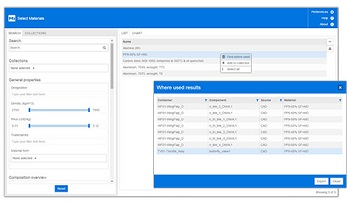Oct 27 2015
Granta Design today announced new capabilities in its GRANTA MI™ materials information management system, further enhancing materials support for enterprise Computer-Aided Design (CAD) and Product Lifecycle Management (PLM).

A new web app answers the often-crucial question: ‘Where is this material used?’, CAD users can now explore alternative materials, and there is a new option for PLM integration. GRANTA MI enables enterprises to efficiently manage vital proprietary information about their engineering materials, combine it with a comprehensive library of reference data on materials properties, and apply this knowledge-base in design and development—including within CAD, PLM, and Computer-Aided Engineering (CAE).
The new ‘where used?’ app enables designers selecting a material from their GRANTA MI database to query their PLM system to find out which of their existing products or parts already contain that material. When considering a plastic for a new product, for example, the designer may want to know where else that grade has been used so knowledge from earlier applications can help optimize design or avoid problems.
Another use is to ask which products are at-risk when a material is rendered obsolete by regulation or supply problems. The app brings together company material and product application data to quickly answer such crucial questions via a user-friendly interface that requires no knowledge of complex product data structures.
The GRANTA MI:Materials Gateway plug-ins provide direct access to corporate materials data within CAD, CAE, and PLM. CAD users, for example, can pick a material, apply it to their model, then use the associated data for analytics. But what if a designer can’t find a material that quite meets their requirements? Now they can request a variant material based on an existing specification, identifying properties they would like to change.
This could trigger a request to their materials team to see whether the new specification can be met. Thus designers have scope to explore options, but in a controlled way that connects to the company’s materials engineering process. This tool, based on customer feedback, is built for real design workflows.
Organizations that use the latest Teamcenter PLM now have an alternative method for integrating materials information. They can bulk ‘author’ materials information from GRANTA MI into the Teamcenter Integrated Materials Management (IMM) data model, where it can be assigned and used by Teamcenter tools.
Users can then employ the full power of GRANTA MI to manage the complex lifecycle of materials information for every material and property in their corporate knowledge-base, upload the data required for their products into PLM, and retain a ‘live link’ to the source, enabling traceability and updates as data changes.
We’re pleased to provide new tools and, in partnership with Siemens PLM, a new option to author materials data into PLM. Enterprises have varying strategies for materials knowledge provision to CAD, PLM, and their product development process. These features help to support all customers in this area, whatever approach they choose.
Dr Arthur Fairfull - Director of Materials Strategy and PLM at Granta
Granta’s technology for enterprise CAD and PLM is being demonstrated at this week’s Siemens PLM Connection Europe event in Berlin and at a web seminar on Nov 12. See www.grantadesign.com/events/.